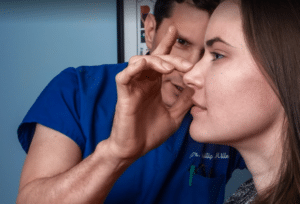7 Rhinoplasty Preparation Tips

July 1, 2014

- 1. Discuss your medical history.
The most important question your doctor will ask you is what your motivation for surgery is and what your goals are. Your doctor will also ask you about your medical history. This includes any nasal surgeries, obstruction, or any medications you take. If you have hemophilia, a bleeding disorder, you may not be able to have rhinoplasty.
- 2. Get a physical examination.
Prior to surgery, your doctor will conduct a complete physical examination. This includes any laboratory tests, such as blood tests. Your doctor will examine your skin and the interior and exterior of your nose. The physical examination will help your doctor to make customized choices for your benefit. This also allows the doctor to examine your physical features (thickness or skin and strength of cartilage) and determine if it will affect your results. Most importantly, the doctor will determine the impact of rhinoplasty on your breathing.
- 3. Take pictures.
Someone from the doctor’s office will take multiple pictures, from different angles, of your nose. The doctor will then manipulate the pictures to show you what results you can expect. Additionally, the pictures will be used for before and after purposes.
- 4. Discuss your expectations.
It’s important for you to discuss with your doctor your motivations and expectations. It’s also important to have realistic expectations. Your doctor will discuss with you what rhinoplasty can and cannot accomplish for you.
- 5. Avoid certain medications.
You should avoid any anti-inflammatory and blood-thinning (Advil, Motrin, and others) medications up to 2 weeks before your surgery. Only take medications that are approved by your doctor.
- 6. Stop smoking.
Smoking increases the likeliness of infection and can slow the healing process after surgery.
- 7. Plan for your surgery day.
You should arrange to have someone drive you to and from surgery, as you will be going under anesthesia. Also, you should make sure someone will be available to watch you for a day or two after your surgery to make you follow all personal care that is recommended after your surgery.
By following each of these rhinoplasty preparation tips, your surgery is likely to go smoothly and effectively. We hope you find these tips helpful, see you soon!
For more information visit our page on rhinoplasty.
Focusing exclusively on the face for more than two decades, double-board certified facial plastic surgeon Dr. Philip Miller blends art and science with innovation and skill to provide thousands of patients with impeccable results. He is known for pioneering the NatraLook methodology for rhinoplasty, facelifts, neck lifts, and other cosmetic procedures for the face.

